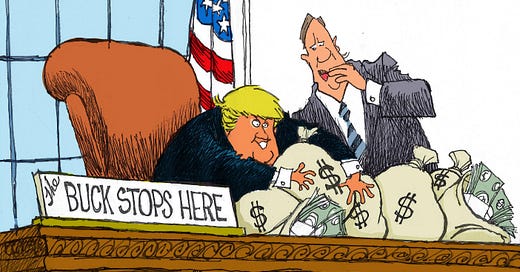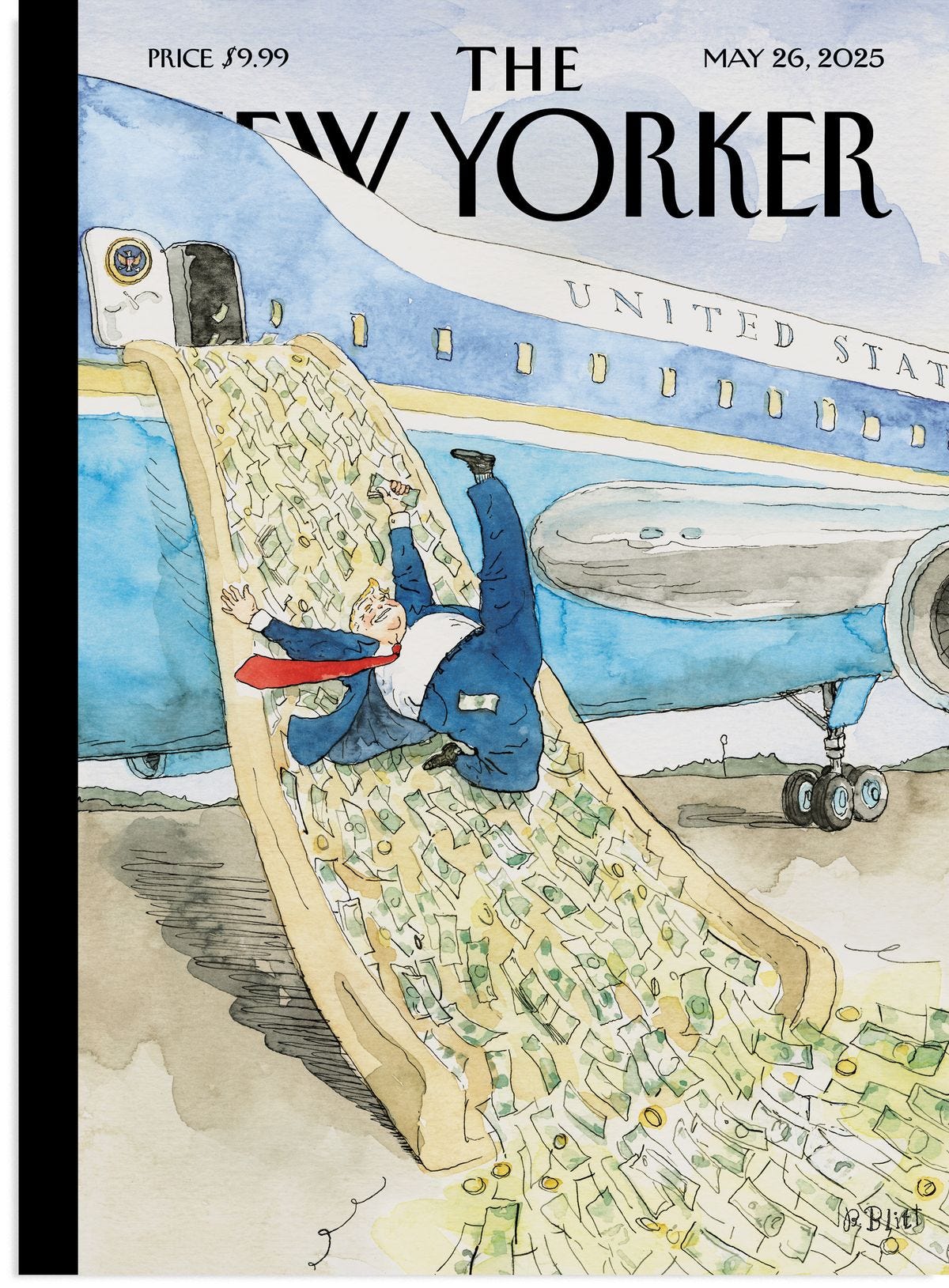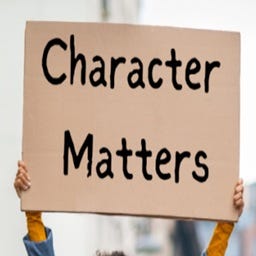“Leadership is a privilege to better the lives of others. It is not an opportunity to satisfy personal greed.” ~Mwai Kibaki
Lately I’ve been reading about the Johnson administration and The Great Society, of which its dismantling and destruction is one of the goals of Trump’s Project 2025.
One can argue about The Great Society’s effectiveness — we still have people living in poverty; we still see voter rights being suppressed; we still have people struggling with housing and food insecurity; we still see discrimination. Regardless, the The Great Society was the dream for the more perfect union that Lyndon Johnson wanted.
One of the things that strikes me about Lyndon Johnson is how he loved the power of the presidency - probably as much as Trump does. He loved the power he had as Senate Majority Leader as well. As a senator from Texas, he understood politically that much of the so-called Great Society would have been an anathema to his voters. As a result, he might not have supported much of it, if it had been presented to him as a senator. After all, he was a political animal.
But once he became president, he saw himself as the leader of whole country — not just his voters from Texas. He was genuinely excited and motivated about using the power of the presidency to actually help Americans, who were marginalized and struggling. Here’s some of his speech before Congress in 1965:
THE PURPOSE OF THIS GOVERNMENT
My first job after college was as a teacher in Cotulla, Tex., in a small Mexican-American school. Few of them could speak English, and I couldn't speak much Spanish. My students were poor and they often came to class without breakfast, hungry. They knew even in their youth the pain of prejudice. They never seemed to know why people disliked them. But they knew it was so, because I saw it in their eyes. I often walked home late in the afternoon, after the classes were finished, wishing there was more that I could do. But all I knew was to teach them the little that I knew, hoping that it might help them against the hardships that lay ahead.
Somehow you never forget what poverty and hatred can do when you see its scars on the hopeful face of a young child.
I never thought then, in 1928, that I would be standing here in 1965. It never even occurred to me in my fondest dreams that I might have the chance to help the sons and daughters of those students and to help people like them all over this country.
But now I do have that chance--and I'll let you in on a secret--I mean to use it. And I hope that you will use it with me.
This is the richest and most powerful country which ever occupied the globe. The might of past empires is little compared to ours. But I do not want to be the President who built empires, or sought grandeur, or extended dominion.
I want to be the President who educated young children to the wonders of their world. I want to be the President who helped to feed the hungry and to prepare them to be taxpayers instead of tax-eaters.
I want to be the President who helped the poor to find their own way and who protected the right of every citizen to vote in every election.
I want to be the President who helped to end hatred among his fellow men and who promoted love among the people of all races and all regions and all parties.
I want to be the President who helped to end war among the brothers of this earth.
And so at the request of your beloved Speaker and the Senator from Montana; the majority leader, the Senator from Illinois; the minority leader, Mr. McCulloch, and other Members of both parties, I came here tonight--not as President Roosevelt came down one time in person to veto a bonus bill, not as President Truman came down one time to urge the passage of a railroad bill--but I came down here to ask you to share this task with me and to share it with the people that we both work for. I want this to be the Congress, Republicans and Democrats alike, which did all these things for all these people.
Beyond this great chamber, out yonder in 50 States, are the people that we serve. Who can tell what deep and unspoken hopes are in their hearts tonight as they sit there and listen. We all can guess, from our own lives, how difficult they often find their own pursuit of happiness, how many problems each little family has. They look most of all to themselves for their futures. But I think that they also look to each of us…
Of course, people cannot contribute to the Nation if they are never taught to read or write, if their bodies are stunted from hunger, if their sickness goes untended, if their life is spent in hopeless poverty just drawing a welfare check.
So we want to open the gates to opportunity. But we are also going to give all our people, black and white, the help that they need to walk through those gates.
You can read this article in the New York Times All That Trump Has Changed. The key points they make:
Trump has upended the global order and America’s alliances.
He’s testing the limits of the law.
He’s exerting his influence across society.
He’s turned fear into a tool.
But the point that really stood out for me…
He’s profiting from being president. Many presidents cash in after they leave office. But Trump’s businesses are openly profiting off his brand, striking deals overseas and rewarding some buyers of his family’s cryptocurrency with a private dinner and a tour of the White House. And then there’s that luxury plane from Qatar, a remarkable illustration of how this president feels unencumbered by the longstanding norm against accepting foreign gifts.
The president’s “One, Big, Beautiful Bill” will essentially punish Americans who are trying to keep their heads above water:
Trump’s White House accidentally admitted the truth about its tax plan
In 2029, Americans making less than $30,000 will actually pay more in taxes under the GOP's plan than under current law. Americans making less than $15,000 — the poorest of the poor — will pay 53% more in taxes than they do now as their average tax rate jumps from 3.3% to 5.1%. Meanwhile, households making over a million will pay 6.4% less in taxes (totaling an estimated $74 billion collectively), as their average rate falls from 30.8% to 28.7%.
In a fairly remarkable moment – Democrats on the House floor yielded time to far-right GOP Rep. Thomas Massive, who delivered a searing rebuke of Trump’s billionaire giveaway. His speech was immediately attacked by MAGA. Trump lashes out at Kentucky Republican Thomas Massie: 'He should be voted out of office'
The Presidency is an awesome responsibility. It’s a way to show moral and authentic leadership both nationally and globally. Lyndon Johnson — with all his shortcomings — understood the role, believed in public service and was genuinely excited that he might be able to help Americans who were marginalized and struggling.
I don’t remember any president in my lifetime, who has cared less about public service and more about personal greed than Trump. He sees the presidency simply as a means to increase his personal wealth and keep him from accountability for his crimes. He could care less about helping or serving others — only serving himself and his loyalists.
Sad times ahead.
Thought for the day in honor of his birthday…
“People seldom do what they believe in. They do what is convenient, then repent.”
~ Bob Dylan
Must Read Article
Trump’s Tariffs Are Causing Misery. What if That’s the Point?
Far-right leaders across the modern world—Viktor Orbán, Recep Tayyip Erdoğan to Rodrigo Duterte to name just a few examples—have often presided over periods of social unrest and economic decline. In theory, the uncertainty that characterizes their rule constitutes a failure of governance. In practice, however, it often serves as a useful political strategy, solidifying support through both the metaphorical and literal creation of crisis. Take Trump’s seemingly irrational tariff wars, which have shocked the stock market, discouraged foreign investments, weakened the dollar and cooled both global trade and international relations…
“Even though President Trump and his advisers promise economic prosperity in the long term. It looks more like a situation designed to create scarcity and hardship.”
In other words, perhaps the Trump administration doesn’t actually want to improve the economy, but actively weaken it as part of a larger political strategy. Research has long demonstrated that far-right movements across the world thrive by exploiting feelings of insecurity and uncertainty to deepen sociopolitical divisions and cultivate mistrust in democratic institutions. Periods of crises, from the Great Depression to the Great Recession and the COVID-19 pandemic, create opportunities to generate support by blaming both real and perceived hardship on the political establishment and marginalized groups.
Quote of the day…
“The leader of the Republican Party is now blaming companies for raising prices in response to his Republican tariffs, threatening to use state power to punish companies large and small that adjust their prices to stay in the black. If you support limited government and free markets, not sure how or why you would continue to vote for this.”
~ Heath Mayo
What I’m reading….
Donald Trump’s Culture of Corruption
In the past several weeks, President Donald Trump, who has never been fastidious about separating public and private business, has been involved in a remarkable number of potential conflicts of interest. He recently announced his intention to accept a four-hundred-million-dollar Boeing 747 from the Qatari government, which would be used in lieu of Air Force One for the remainder of his Presidency, after which it would be transferred to his Presidential library; he has continued selling access to himself through his meme coin (a company with ties to China recently announced that it would buy as much as three hundred million dollars’ worth of the coin, $TRUMP); and his trip to Saudi Arabia this week was preceded by his family’s announcement, late last year, of a new Trump Tower Jeddah. The scale of these conflicts may be unique for an American politician, but Trump, who has consistently condemned the Washington “swamp,” is one of many right-wing “populist” leaders and former leaders —Viktor Orbán, of Hungary; Recep Tayyip Erdoğan, of Turkey; Narendra Modi, of India; Jair Bolsonaro, the former President of Brazil—who have won election by running against a supposedly corrupt system, and then become embroiled in corruption scandals that often vastly eclipse those of their predecessors….
There is certainly a connection between autocracy and corruption. There’s also a connection between corruption and all kinds of other things, so autocracy is not the only cause. But if a leader comes to power and starts eliminating all checks on the executive, one set of those checks will be the kinds of things that can detect and control corruption. It’s very often the case that autocrats who want to stay in power forever think, Well, gee, as long as I’m here, why don’t I just grab everything in sight? It’s a pretty common pattern that autocrats, sooner or later, engage in self-enrichment as part of their power grab.
Trump "gold card" site launching within a week
The "gold card" website allowing people to buy U.S. permanent residency for $5 million will launch within a week…Trump announced the gold card in late February, offering permanent U.S. residency to anyone who shelled out the $5 million fee.
It was meant to replace the EB-5 investor visa, which gives out green cards in return for a much smaller investment in the U.S. economy.
Other countries have tried similar so-called golden visa programs, but wound them down after limited interest… the site, trumpcard.gov, would initially allow people to register their interest in buying one of the cards.
Congressional Republicans vs. Reality
The president’s “One, Big, Beautiful Bill” (as Republicans insist on formally calling it) would make the country’s fiscal situation worse. It would slash taxes for years to come, and although it would make some budget cuts, they aren’t anywhere near enough to cover the difference. The bill is projected to add trillions of dollars to the deficit; the only real disagreement among analysts is over how many trillions. Yet Republicans leaders keep trying to pretend otherwise….Republicans are determined to extend Trump’s tax cuts (most of which were set in his first term to expire at the end of 2025), but they are unwilling to raise other taxes, notwithstanding the president’s flirtation with a millionaire’s tax. They are also unwilling to really make spending cuts: Though they plan to slash Medicaid, they realize that attacking Medicare and Social Security is politically toxic. The rub is that Medicaid cuts are also very unpopular. The only way to dress the bill up is with wildly optimistic projections of future growth. And that doesn’t even touch all the other rotten Easter eggs tucked into the bill, such as a provision to prevent federal courts from enforcing contempt rulings against federal officials.
Stripping the South: How Medicaid Cuts Could Break Black Disabled Families
In the Deep South, Medicaid isn’t just a support system — it is the system. With many Southern Black families lacking access to employer-sponsored insurance and living in states that long rejected its expansion, the program serves as the only lifeline for thousands with disabilities.
Donald Trump hosted a dinner for the biggest purchasers of his $Trump memecoin in what was the most extraordinary collection of rogues, chiselers, and sleazoids that ever gathered together at a White House-sponsored event, with the possible exception of when Donald Trump dined alone.
“Anyone who thinks those 220 people who are attending the dinner tonight who paid about $150 million for those seats just really craved to have a digital equivalent of a baseball trading card, well, you’re a little off the mark,” Senator Jeff Merkley said. “They absolutely want to buy influence over U.S. policy.”
Memecoin Dinner Offers Foreign, Anonymous Donors Access to Trump
Some ethics experts believe that the memecoin, and the exclusive dinner for its top investors, is a serious ethics concern. “President Trump used the presidency in his first term to raise money for his businesses, but nothing this blatant,” Richard Painter, who served as the chief ethics adviser to President George W. Bush from 2005 to 2007, told The Dispatch in an email. “Trump now seeks to take this to the next level—Teslas are sold at the White House, he issues his own personal memecoin, and he offers private dinners for investors in the coin. This is the use of public office for private gain in violation of federal ethics rules.”
Trump Tariffs Crash European Business Travel to U.S.
Europeans are scaling back business trips to the United States amid the Trump administration’s intensifying hostilities toward trade partners and immigrant visitors. European business travel bookings to the U.S. in April dropped 26 percent compared to the same month last year as companies seek markets offering “greater stability.”
Nike Raises Prices as It Braces for Trump Tariffs
As Trump‘s tariffs continue to hit major retailers across the country, Nike plans to raise prices on many of its products sooner than expected. Although the new prices are supposed to go into effect on June 1, a person familiar with the issue told NBC News that customers might see increased prices on shelves as early as this week. Footwear, apparel, and equipment will see an increase between $2 and $10, depending on their original prices.
Target Sales Drop Sharply Amid Americans’ Tariff Fears
Target has slashed its annual sales forecast, citing economic uncertainty caused by President Donald Trump’s tariff war. The big-box retailer revealed its shares were down by 3.7 percent on Wednesday, reflecting a larger trend of digital sales replacing in-store purchases.
Donald Trump’s unilateral implementation of tariffs on foreign imports is doing demonstrable damage to economic growth and business profitability. Yet rather than publicly target the president’s trade policies, the group is relying on respectful lobbying to obtain relief for its members.
This strategy is a product of Trump’s centrality to this process. …Most major industry lobbying organizations in Washington, D.C., representing corporate America and businesses large and small, fear angering Trump with strident opposition to his trade agenda. So, while these groups are candid about the negative impact tariffs are having on the economy generally and businesses specifically, they have essentially put away the proverbial political stick wielded against previous presidents and have instead attempted to woo Trump with political carrots. C.E.O.s Hold Their Tongues to Avoid Attracting Trump’s Anger
How Donald Trump’s Crypto Dealings Push the Bounds of Corruption
The World Liberty operation has far vaster implications than the meme coin, however, because its stablecoin, which can be easily and reliably exchanged for U.S. dollars, creates something like an entire Trump-sponsored underground economy. It’s as if a new bank had opened under the sitting President’s name, and it was being sent large quantities of funds by various foreign businesses and political élites. Major buyers of WLFI have included Justin Sun, a Chinese crypto entrepreneur, who bought seventy-five million dollars’ worth, and DWF Labs, an Abu Dhabi-based cryptocurrency trading firm, which bought twenty-five million dollars’ worth. In March, World Liberty announced that it had sold more than half a billion dollars’ worth of its token. Earlier this month, another Abu Dhabi-based investment firm announced that it would use USD1, the stablecoin controlled by World Liberty, for a two-billion-dollar investment in Binance, the largest cryptocurrency exchange in the world.
Apparently, Donald Trump is going through some things.
I won’t attempt to sane-wash Trump’s meshuga bleat about Wal-Mart, but let’s try to de-complexify it. Our conservative free-market neo-Marxist president is now trying to dictate price controls to private companies, while railing against corporate profits. Beyond that, his position seems more a bit addled.
Why, after all, is Trump insisting that Walmart “EAT THE TRAIFFS” if — as he has repeatedly told us — “a tariff is a tax on a foreign country”? Hasn’t the man who told us that Mexico would pay for the Wall, reliably assured us that China and other countries would “pay to do business” with us?
Weren’t they supposed to be the ones who EAT THE TARIFFS? ….
Do the math here: By some estimates, Wal-Mart imports about $49-$50 billion worth of goods from China. With Trump’s 30% tariff that means that the company would have to “EAT” about $15 billion — or nearly the company’s entire net profit. So what does this mean for consumers? Higher prices for food — bananas, avocados, and coffee for starters. Higher prices for gaming products, iPhones, clothes, car-seats, an baby gear. Higher prices for back-to-school supplies, and higher prices for toys, since 80 percent of the toys sold in the United States are made in China.
But now, the president seems to be in full panic-mode — and shedding any pretense that he’s a free-marketer.
Trump Berates Companies for Warning About Tariff Price Increases
While the White House insists the president’s strategy is working — generating new revenue and forcing nations to negotiate — some companies have started to report early signs of financial strain. Their warnings have affirmed economists’ long and widely held belief that tariffs fall hardest on U.S. companies and consumers, not the allies and adversaries that Mr. Trump seeks to punish.
Military Families Could Go Hungry Due to Food Assistance Cuts in GOP's 'Big Beautiful Bill'
Military families struggling with food insecurity could be among the potentially millions of people who lose food assistance under sweeping cuts to the benefits being advanced by House Republicans, advocates are warning. The One Big Beautiful Bill Act, as Republicans are now calling their wide-ranging legislation to enact President Donald Trump's agenda, would cut federal funding for the Supplemental Nutrition Assistance Program, or SNAP. States would be tasked with making up the difference in funding, but states with budget constraints could need to make drastic cuts to the program that leave millions without benefits.
The argument's over: Americans pay for tariffs
Nearly a decade of Trump trade arguments held that foreign countries, not Americans, paid the ultimate cost of a trade war. But the president and his economic team now acknowledge that tariffs are raising prices for everyone, from industrial ports to retail storefronts.
The big picture: Trump's sweeping global tariffs, effectively the highest in nearly a century, are expected to cost the average household more than $2,300 a year, according to the Yale Budget Lab….
They argued while consumer prices may rise due to tariffs, people will see even bigger benefits from the falling price of gasoline — was effectively a tax cut for consumers, and would help keep inflation in line.
Reality check: With the average American vehicle using a little under 500 gallons of gas a year, and gas prices per gallon being a little over 40 cents cheaper today than a year ago, the average driver is looking at an annual savings of around $200 per car.
Bessent Defends Trump’s Jet Gift With Ridiculous Comparison
Scott Bessent compared apples to oranges while defending Donald Trump’s acceptance of a $400 million jet from Qatar.
“The French gave us the Statue of Liberty, the British gave us the Resolute Desk,” the Treasury Secretary said in an interview with CNN’s Jake Tapper. “I’m not sure they asked for anything in advance.”
Tapper pushed back, pointing out the crucial difference between the Statue of Liberty and the lavish airliner: The iconic landmark remains the property of the U.S. government, while the Qatari jet will be transferred to the Trump Presidential Library Foundation ahead of the president’s departure from office.
Trump’s vision for Air Force One will turn it from the ‘Flying White House’ to a ‘palace in the sky’
Turning Qatari 747 into Air Force One could cost $1 billion and take years, experts say. And Trump’s complaint that Arab leaders have bigger and more impressive airplanes than the current Air Force One … Trump’s concerns about Air Force One seem less focused on safety and security and more on size and opulence. His longing for a “palace in the sky” is befitting for a president drawn to soaring skyscrapers, lavish parades and gold ornamentation.
Temptation as a Public Policy Problem
That’s a problem, because while temptation goods have gotten better, our ability to control ourselves hasn’t. The uncomfortable reality of human variation in self-control has meant a growing share of the population is unable to stop itself from clicking that “buy now, pay later” button.
What I’m listening to…
What I’m watching…
Three videos about the Trump greed worth watching including Massie’s remarkable speech….







